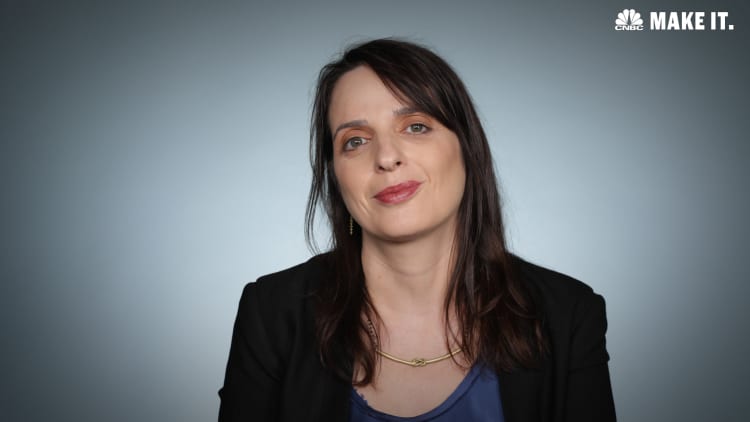Some of today's most notable companies began as side hustles before they saw success. And at some point, all these founders had to ask themselves the same question: "Will this idea scale?"
I've been a venture capitalist for 15 years, investing all over North America in 40 companies, including Peloton and Bill.com, both of which went public, and Freshly, which was acquired by Nestle for $1.5 billion.
In 2017, I founded H Venture Partners to help entrepreneurs launching consumer brands connect with the capital and expertise they need to grow their companies, from help with research and development to introductions to retailers like Target and Walmart. To date, we've invested in nine brands led by a diverse group of founders — women, people of color, members of the LGBTQIA+ community — and we're proud to be their partners in growth.
More from Grow:
6 remote jobs in high demand that can pay as much as $77,000 a year
My side hustles bring in up to $4,000 a month: Here's my best advice
Looking to start a side hustle? This quiz tells you which is right for you
In my experience, if you've ever dreamed of being an entrepreneur, starting small is a great way to go. When I'm looking to invest in a company, I like to see proof of concept. For a lot of businesses, you can get proof of concept with a side hustle. I just connected with an entrepreneur who realized she was on to something when she kept selling out all of her product at farmers markets. Now she's selling online and in key retailers, applying to accelerator programs along the way.
So if you're thinking about turning your side hustle into a full-time career and especially if you're seeking venture capital to do that, here is my best advice.
Ask yourself these key questions
Many founders wonder when they should quit their day job to pursue a side hustle as a full-time job. First things first: Ask yourself if you're really passionate about the idea. Remember, you'll be living and breathing your company for a long time, which means you should be deeply invested in the problem you're trying to solve.
Second, ask if the idea is big enough. Not every business is meant to be a unicorn, a term in venture capital that we use to describe companies with a $1 billion valuation. Most will be great small to medium size enterprises, and that's great. But if you're raising venture capital, your investors are likely looking for a big exit in 5 to 10 years.
Ask yourself, what is the widest possible market for your product or service? What's your profit margin? Is there a way for investors to make a good return on investment?
Do your research. It's one thing to put a product or service out there that people will buy but another thing to have it priced right and still generate reasonable margins.
Get feedback and give yourself room to breathe
The next step is to gain some traction. Develop your business model and refine how you're going to make money. Let your friends know what you're doing and ask them to spread the word if they like the product or service. Safely set up shop at your farmers markets or, especially in this current moment, seek out trade and industry associations, virtual events, webinars, and brand collaborations.
Try to get your product or service in front of as many potential customers as possible, and get feedback. The more you know about your customer and what they want, the better.
Rachel Drori, the founder and CEO of the food start-up Daily Harvest, decided that she wasn't going to quit her job until she had more customers she didn't know than ones she did. This is a smart approach because it demonstrated to her that people were buying because they truly loved the product, not just to support a friend.
Having answered these questions, before quitting your job, I would make sure that you have enough money saved or raised from friends, family, and angel investors to pay the bills for the next year to give yourself enough runway to really dedicate yourself to the business.
The more you know about your customer and what they want, the better.
Find the people who believe in your vision
The first investment into a business is often from a friends and family round, which typically ranges anywhere from $100,000 to $1 million. This money is used to create a proof of concept: a minimum viable product, an e-commerce site, or whatever you need to test your initial offering.
But before reaching out to your close circle, I'd suggest talking to angel investors and venture capital investors early on, even if you're not immediately considering that kind of funding. Angel investors and venture capitalists are used to giving feedback and poking holes in assumptions. This free advice can be invaluable when it comes to saving you time and money.
Crunchbase and AngelList are great resources for finding angel investors and VCs that invest in your type of business. You also may want to consider accelerator programs like Y Combinator, 500 Startups, or Techstars, which can help prepare you for raising venture capital. At this point, if you are getting funds from friends and family, I would just make sure that they understand that startups can be risky endeavors, and the earliest they are likely to get their money back is at the 10 year mark, if at all.
As an investor, I'm personally looking for a great product, scrappy and effective marketing tactics, repeat customers, and compelling margins. One of the best sources of early capital is people who know you and believe in you, have the funds to back you and relevant expertise — like other business owners who have built a business from the ground up, or experts and well-known executives in your field.
Only fundraise when you need outside capital to level up
There are definitely pros to taking on venture capital investors besides the capital they provide, including the wealth of experience and industry contacts they have.
Here's the big question: When exactly should you raise a round of funding from venture capitalist investors? When you absolutely need outside capital to grow your business to the next level. The more traction you can get early on, the more excited investors will be and the better valuation you'll be able to command, which can mean a bigger payoff for you down the road.
Your start-up's valuation, or the amount that investors are willing to pay for stock in your company, is going to be based on a number of different factors like the expertise of your team, the value proposition, barriers to entry, and the stage of your development — idea, prototype, product launched, and revenue-generating.
It's important to know that if you're raising money from venture capital investors, you're committing to a high-growth pathway — and to selling the business in the next 5 to 10 years. You're also signing up for financial partners that you're going to be spending a lot of time with over that time, so make sure they are people you like and trust.

Video by Stephen Parkhurst
Know the problem you're solving inside and out
When approaching venture capitalists, you'll need a well-researched, dynamic financial model and a pitch that tells a compelling story: So ask yourself, what is the problem you're solving and how big is the market? Why are you the right team to solve the problem? Investors really value domain expertise.
If you're selling a hair care product direct-to-consumer, for example, have you ever worked in the hair care industry? Have you ever sold direct-to-consumer successfully? Your pitch should also include pricing, margins, competitive landscape, high level financial projections, how much you're raising, and how you would use those funds.
You'll want to target early-stage investors who seek out companies like yours: in your stage, category, and geography. Start with a big list of targets, 100 or so, and reach out to your least-aligned first to get their feedback, and refine your pitch before moving onto investors that are at the top of your list.
Ask yourself, what is the problem you're solving and how big is the market? Why are you the right team to solve the problem?
Be clear about your long-term goals
Keep in mind that it can take several weeks for investors to get back to you, and many won't. The ones that do may give you just 30 minutes on their calendar, so keep explanations short and hit the highlights. From pitch to close, it can take 3-6 months to get a deal done, so factor that into your planning.
Ultimately, not every company is meant for venture funding, especially if it's a slower-growing business or a company you want to run forever. Venture capitalist investors are looking for a 10x return on their money within 10 years, so they'll be looking for an exit, usually a strategic acquisition or an IPO, which may not sync with your long term goals.
Consider the outcome you'd like to see now, before you take on capital. And remember that you have the most control over your company when it's still a side hustle or a small business. Growing any business is a worthy adventure, however you want to approach it. And if you decide that venture capital is the route you'd like to take, when the time is right, we would love to meet you.
Elizabeth Edwards is the founder and Managing Partner of H Venture Partners, a consumer-focused venture capital fund. Before starting H Venture Partners, Edwards invested in more than 30 companies over 15 years as a venture capital investor, including Peloton (IPO), Freshly (acquired: Nestle), OneHope Wine, and Bill.com (IPO). Edwards started her career at Deloitte Consulting, working with consumer brands like Tylenol and XM Satellite Radio.
The article "Venture Capitalist: My Best Advice for How to Grow and Scale Your Business" originally published on Grow+Acorns.


